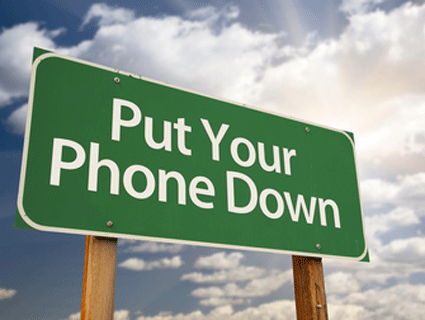
<a href="http://www.shutterstock.com/cat.mhtml?lang=en&search_source=search_form&version=llv1&anyorall=all&safesearch=1&searchterm=cell+phone+and+driving&search_group=#id=84661507&src=wES65TdW8mstmqFSRdV4Xw-1-19">Andy Dean Photography</a>/Shutterstock
April is Distracted Driving Awareness Month, a time when safety and transportation experts beg, plead and cajole Americans to put down their phones while driving, lest they become a murderer behind the wheel. It’s a thankless job, as American drivers suffer from some serious delusions about their abilities to pilot a car safely while texting their girlfriends, shopping on eBay, or dialing in to Rush Limbaugh. Despite the fact that a quarter of all motor vehicle crashes today involve cellphone use, Americans still think it’s only other drivers who are the problem. More than 90 percent of drivers think other drivers texting or using cellphones behind the wheel are a threat to their personal safety, yet two in three of them do it anyway, according to the AAA Foundation for Traffic Safety.
Elected officials have been reluctant to address the problem, passing legislation that reinforces drivers’ delusions—like the law here in DC that allows people to drive and talk on the phone so long as they use a hands-free device, even though there’s no evidence that talking on a Bluetooth is any safer than just holding up the old phone. (Spend some time in DC cabs to get a sense of how well this law is working out.)
Phone companies have been trying to come up with technical solutions that might head off further attempts by lawmakers to curb cellphone use while driving. The latest of these has been the suggestion that Siri can help. The idea is that simply talking to your phone to send a text rather than punching in the message would somehow allow people to keep their eyes on the road and drive safely while texting. As it turns out, the notion that an app will save lives is as faulty as the promise that the Bluetooth would.
A new study out from the Texas A&M Transportation Institute this month found that:
- Driver response time was terrible regardless of whether the driver was manually texting or using Siri.
- Texting drivers of any sort took twice as long to react to roadway hazards than when they were off the phone.
- Texting drivers spent a lot of time not looking at the road, regardless of whether they were using a voice-to-text app.
- Manual texting was actually quicker than using a voice app, but driving performance was equally bad in both cases.
The new study also found a new form of distracted driving delusions: Drivers felt less safe when they were texting, but they felt safer using a voice app than texting manually, even though their performance on the road was equally dangerous.
Moral of the story: When you get behind the wheel of a motor vehicle, just put down the damn phone! And just as a chilling reminder of why this is important, watch this video:















